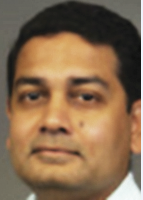EDINBURG — The University of Texas Rio Grande Valley received nearly half-a-million-dollars to research and develop a new anti-HIV drug using nanotechnology that could place the academic institution at the forefront of a possible medical breakthrough.
The National Institute of Neurological Disorders and Stroke awarded UTRGV nearly $500,000 in federal funding earlier this month, U.S Rep. Vicente Gonzalez announced Wednesday.
The grant will finance the research and development of a nano-formulated anti-HIV drug.
HIV remains one of the leading causes of death worldwide, principally in developing countries, Gonzalez said. And although the present drug therapy has significantly reduced the mortality rate among patients, major limitations remain given the complexity of dosing regimens, drug metabolism, and numerous side effects.
“It is a joy to know that the Rio Grande Valley and UTRGV will be at the forefront of medicine that could change the world,” Gonzalez said in a news release. “This cutting-edge drug delivery research will help stimulate a robust research environment at our leading minority-serving institution and also expose students to a thriving biomedical research environment.”
Gonzalez credited three academic professionals for their work in obtaining the grant: Dr. Upal Roy, the principal investigator and UTRGV assistant professor of Health and Biomedical Sciences, Dr. Mito from the UTRGV Department of Chemistry and Dr. Vadym Dorzd from Florida International University in Miami, Florida,
“We are very proud of Dr. Roy’s accomplishments and knowing that his research has been judged to be competitive and to address a significant scientific problem on the national level,” said Dr. Michael Lehker, UTRGV Dean of the College of Health Affairs.
His college is focused on building a research infrastructure that will support its mission to promote health equity and to provide meaningful learning opportunities for students, Lehker said.
“Dr. Roy’s grant is yet another step toward achieving this goal,” the dean added.
The program began July 1 and is set to run until June 30, 2021.




